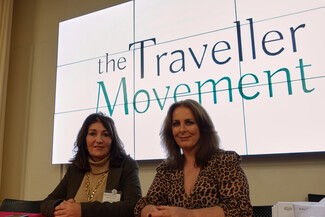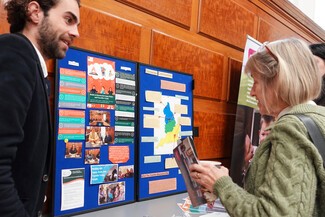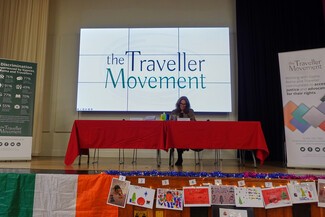Traveller Movement welcomes over 150 for annual policy conference

The Traveller Movement welcomed over 150 community members, policymakers, elected politicians, experts and stakeholders to the first in-person conference since the COVID-19 pandemic, in central London on 17th November.
Mary Foy MP, Co-Chair of the All-Party Parliamentary Groups for Gypsies, Roma and Travellers, opened the conference with a stark reminder of the inequalities facing Gypsy, Roma and Traveller communities across a range of social indicators. Two panel discussions delved deeper into these inequalities, with discussions on an increasingly urgent mental health crisis, and the impact of the still unfolding cost of living crisis.
As pointed out by Mary Foy MP, the Chancellor of Exchequer presented the Autumn Statement budget in Parliament, the very same day the conference had taken place. This timely event made the conference even more significant, since many in the community, including those living on Traveller sites with no direct contract with an energy supplier and those who have no fixed address or are ‘off-grid’, are not eligible for most, if not all, of the available government support.

The first panel included Social Care Worker and Traveller Movement Trustee, John McCarthy, and GRT Project Facilitator and activist, Olivia Hammond, who spoke about their lived experiences. John McCarthy reported on shared issues for people living on sites and how it is worsened by the cost-of-living crisis. His claims included people not receiving important mail (e.g. bills), which leads to missing payments and accumulating debt, and having none or unsecure tenancy and the worry of potential homelessness. McCarthy also claimed that families with young kids are struggling to attend school because transport funds in certain areas have been cut so the school buses are no longer running.
Max Williams, Senior Researcher from Runnymede Trust spoke in regards to the research publication “Falling Faster Amid the Cost-of-Living Crisis”, that focuses on the disproportionate suffering and income poverty for ethnic minorities. During his presentation Max Williams said, “Minority ethnic groups are less likely to benefit from government support schemes. Targeted support and improved access is needed".
The second panel focused on mental health and suicide prevention delivered also by a mix of testimonies from community members and industry specialists. Martin Gallagher, PH Candidate and Mental Health Activist, delivered a powerful testimony about his experiences of discrimination growing up and how it affected his mental health. After reciting that the suicide rate for Travellers is six times higher than the general population (according to the All-Ireland Traveller Health Study), he fears that a future statistic for young Traveller people is inevitable as more young people are taking their own life. In order to tackle this issue within the community, Martin Gallagher believes that mental health services need to be educated about the issues GRT people face from an early age, and should provide accessible support. He added that the internal stigma within communities of talking about mental health needs to be addressed.
Rianne Eimers, CEO of Mind in Kingston, was also on the second panel and focused on the structural barriers and stigma GRT people face in the mental healthcare system. She claims that GRT people are experiencing prejudice and discrimination once they are in the system which leads to restrictive intervention (for example isolation) instead of talking therapy. “We consider the mental health system to be racist,” said Rianne Eimers.
Rianne Eimers believes the solution lies with the 2022 Mental Health Bill that is currently being drafted, click here to read. Eimers opinion is that the current draft does not tackle systematic racism, and believes there should be an anti-racist intervention included in the bill as well as culturally appropriate advocacy in delivering mental healthcare services.
Joining the second panel was Maurice Mcleod, Chief Executive of Race on the Agenda. Maurice Mcleod also made comment regarding the Mental Health Bill draft, stating that within the draft there is an attempt to bridge the disparities within minority communities. He goes on to explain the fault of the draft is where there is lack of knowledge of minority communities and it does not demonstrate any understanding of how they are working with the communities to solve this. “The solutions to the issues communities face is within the communities,” said Maurice Mcleod.

A series of afternoon workshop discussions explored how members of Gypsy, Roma, and Traveller communities are responding to the cost of living crisis; the impact of suicide; shaming narratives and cultural expectations; and youth provision for young Gypsies, Roma and Travellers.
The workshop sessions each produced key recommendations which will inform the Traveller Movement’s policy, advocacy, partnerships, and campaigning work over the next 12 months.
A full conference report, setting out further detail on each of these important areas, will be released early in the New Year
Yvonne McNamara (CEO of the Traveller Movement) said:
“We were delighted to see old faces, and welcome many people for the very first time, at the first in-person conference we have held since the COVID-19 pandemic. There is an energy to these physical events that just cannot be replicated online, but we always stress that conference is not a one off event, and we work through the year to deliver on the recommendations that delegates provide us with on the day.
We’d like to express our sincerest thanks for everyone who attended and contributed to making conference such a success. We are particularly grateful to our Gypsy, Roma, and Traveller delegates who were willing to speak so candidly and powerfully about issues which are often very difficult to address.”
TT News/Traveller Movement PR
Photographs by Liza Mortimer for Travellers' Times